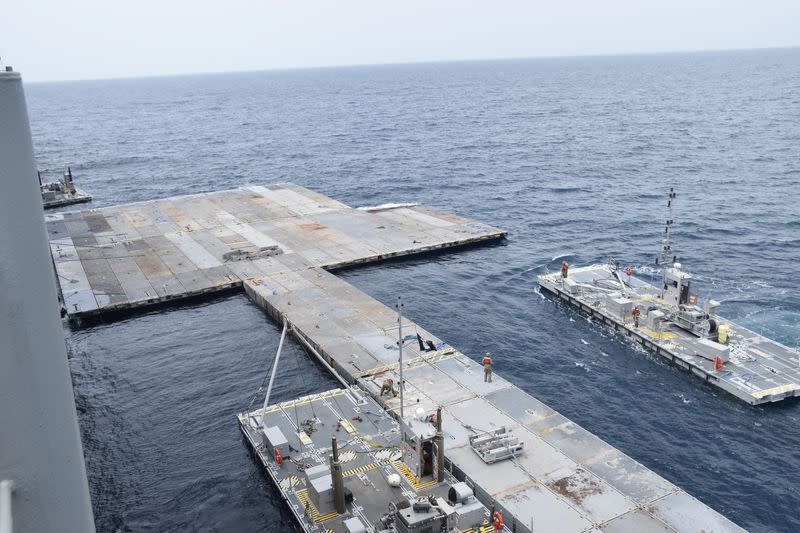Three US troops have non-combat injuries during Gaza pier operation

By Idrees Ali and Phil Stewart
WASHINGTON (Reuters) - Three U.S. troops suffered non-combat injuries in the effort to make a temporary pier off the coast of Gaza into a conduit for humanitarian aid, with one in critical condition at an Israeli hospital, U.S. officials said on Thursday.
The injuries were the first for U.S. forces during the latest operation to bring humanitarian aid to Palestinians.
The pier was announced by U.S. President Joe Biden in March and involved the military assembling the floating structure off the coast. Estimated to cost $320 million for the first 90 days and involve about 1,000 U.S. service members, it went into operation last week.
U.S. Vice Admiral Brad Cooper, the deputy commander of U.S. Central Command, told reporters that two of the troops had a sprained ankle and a minor back injury.
"Two were very minor, routine injuries. Those individuals returned to duty," Cooper said.
A third service member, injured on a ship at sea, was medically evacuated to a hospital in Israel, he said. A U.S. defense official, speaking on the condition of anonymity, said the individual was in critical condition.
U.S. lawmakers have voiced concern about the risks to positioning U.S. troops off the coast of Gaza. Biden has said they will not step foot in the war-torn city itself.
The Pentagon has said it will prioritize the safety of U.S. military personnel.
"We're clear eyed and we continue to look at force protection all day, every day and as it stands now we assess the operations can continue," Cooper said.
Social media images showed a U.S. air defense system, known as the Counter Rockets, Artillery and Mortars (CRAM), firing into the sky while on the pier. U.S. officials said troops were testing the system.
Daniel Dieckhaus of the U.S. Agency for International Development said that since the pier opened last week, about 506 metric tons of aid had been handed off to humanitarian groups inside Gaza. About a third of that has not yet been distributed but would be soon, he said.
(Reporting by Idrees Ali and Phil Stewart; editing by Jonathan Oatis and Cynthia Osterman)

